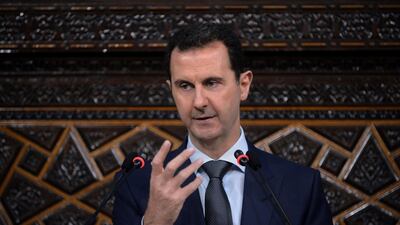America’s national security adviser put the Syrian government on notice over its renewed use of chemical weapons on Saturday as he warned that the state was at the intersection of America’s top security concerns.
In comments that echoed French President Emmanuel Macron’s warning of intervention against Damascus, HR McMaster told the Munich Security Conference on Saturday that Syria was one of three “rogue” states, along with Iran and North Korea, engaged in proliferation of weapons of mass destruction.
“We reacted [once] to deter future chemical attacks and to ensure use of these weapons never became routine,” he said, referring to US missile strikes on a Syrian air base last April after a sarin gas attack in the town of Khan Sheikhoun. "Public accounts and photos clearly show that Assad's chemical weapons use is continuing.
"It is time for all nations to hold the Syrian regime and its sponsors accountable for their actions and support the efforts of the Organisation for the Prohibition of Chemical Weapons.”
The career army officer said Syria was the point at which Washington’s three greatest security concerns were present: spread of deadly weapons, extremist terrorism and subversion of international rules.
America faced challenges from both Turkey and Russia in its handling of the Syria crisis as each country made set piece contributions to the conference on Saturday.
Refusing to back away from Turkish President Recep Tayyip Erdogan’s remark that the US could face an “Ottoman slap” in Syria, Binali Yildirim, the prime minister, effectively blamed the country’s Nato ally for the re-emergence of the threat from the PKK and its affiliates.
“They weren’t alone when they reappeared under a different name,” he said. “They used the weapons which they obtained from the US, Russia or other countries through direct or illegitimate ways, and they used those weapons against the people. Do you know that the weapons of different countries are sold online in Syria and terrorist organisations buy them? How could it be defined as counterterrorism?
“If a country treats us as their enemy and decides to wage war against us, we will not hesitate to respond, though we would not like to be in such a situation,” he said.
Mr Yildirim added that Turkey wanted to see the Russian-backed negotiations in Astana and Sochi take precedence over attempts to revive the Geneva talks on rewriting Syria's constitution as a platform for reconciliation with the opposition.
Sergey Lavrov, the Russian foreign minister, called for a grand international coalition, also including the Europeans and Chinese, to seek a new “security architecture in the Middle East”, including the Arabian Gulf.
Moscow favoured an “external mechanism” to both influence the situation on the ground and raise trust levels between regional states, he said.

